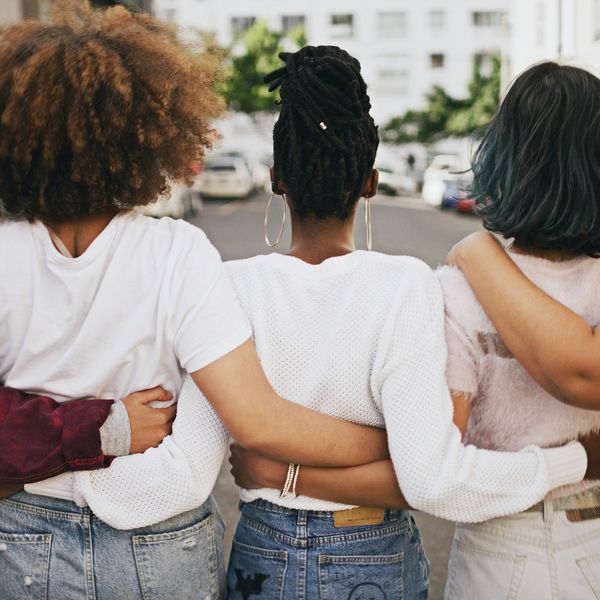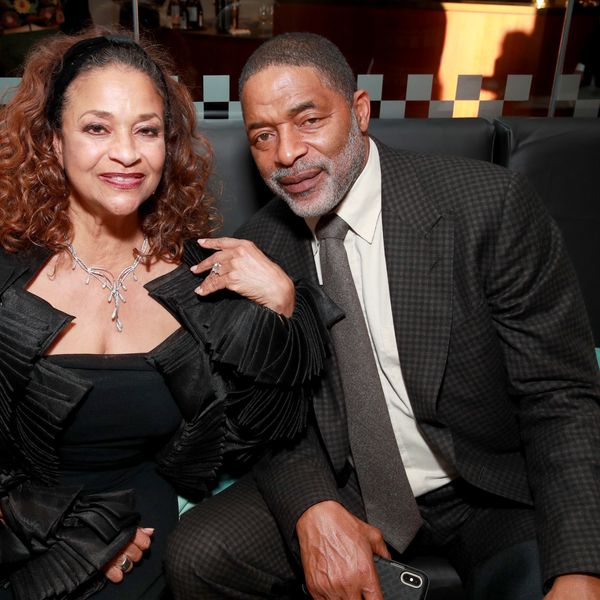
Many of us have heard the refrain “If he wanted to, he would” in response to relationship troubles with seemingly withholding men. It’s a phrase that says, “he’s just not into you.” But what if there’s a little more to the story? Though it’s certainly still a sign to move on, it does point to a missed conversation about the treatment of women.
"He does neglectful or bad things to you because he doesn't like you" ignores everything we've learned about abuse, control, trauma, and intimate partner violence. People's level of interest is not directly correlative to the treatment of their partners. It's actually a reflection of their inner state. In a world where misogyny exists, the increasingly poor treatment of women is not a coincidence or evidence of desire.
It is an expression of belief about how you engage the feminine. In the context of misogyny, how others engage women is often about power.
"If he wanted to, he would."
This is certainly true, but who is speaking to the broader culture and trend of neglectful men? What happens when men never seem to “want to” as a means of normalized engagement?
Are there benefits to men for not “wanting to,” such as creating a dating culture where they have to do less work?
Did it ever occur to you that, in many cases, he may actually be grooming you for cycles of abuse using “pick-up tactics” and/or it is his own fear that keeps his heart small? That many men are taught to continuously deliver low so that the bare minimum feels very big? That cold selfishness is taught to men in capitalist society as a means of survival and identity? That the denial of your own heart's desire is on purpose? That it's not about want, but fear and control? That many men are only taught to relate to women by withholding?
We’ve all been there, men who make us jump through rings of fire for extremely “mid” or even abusive relationships.
Most of us have experienced partners who refuse to acknowledge our needs and humanity because it keeps us small and them in control. Even in cases where carelessness is not intentional, society rewards men for careless behavior. Instead of sanctioning that behavior as undesirable, we label the women as “not desirable enough” to elicit care from a man. Instead of collectively raising the bar of poor behavior and communally calling men to task who exhibit poor behavior, we place the burden of desire on women.
This is not an isolated experience. Men everywhere seem to have collectively created a standard of lack.
Women increase our level of care, hoping that it will eventually lead to better treatment and intimacy while withholding men rest and dangle an emotional carrot on a stick.
They benefit, while women are pressured to constantly perform desirability to men’s tastes because it’s linked to our humanity, survival, and the care we receive. Then it’s taken for granted that for some women, those deemed beneath the patriarchal valuation of “worthy,” men rarely ever seem to “want to.”
Tiered kindness in dating treatment is a method of control.
It says that some people are more worthy of care, depending on how much they inspire our desire. It says that others are merely for our pleasure and therefore deserving of a denial of resources while we engage them. Those with more societal power can pull back positive treatment at their own whims and give it to those they deem “worthy,” as opposed to honoring women they engage as a value system. (Even when those women fall outside the realm of their “desire.”)
Practicing a system of care as a broader social value means that it can no longer be apportioned according to the ever-changing whims of men and their patriarchal standards. Poor or careless treatment is often used to damage a woman’s self-esteem so that her partner can remain in control and not have to show up entirely. Sometimes, the carelessness is the point. It’s an entry point into manipulation by manufacturing desperation and establishing a low bar. It’s a way of re-establishing and reinforcing existing power dynamics and reminding women of “place.”
A partner who has been careless with others is not in the practice of love, so where one suffers, all do.
This practice rarely springs up for the “right woman” in a way that is sustainable over a long period. Selfishness towards anyone you date will appear elsewhere because "liking" people is something that fluctuates. We can make the mistake of thinking we are above the dangers of misogynist dating culture because we are too smart, pretty, or societally celebrated, but this is ultimately a house built on sand and others’ ever-shifting desires.
Where systems of care as cultural norms are absent, all eventually suffer.
We are often all too quick to blame women for whatever happens to us in the space of our innocence and learning. Not "liking" someone isn't an excuse to treat people poorly and for society to then put the blame on the recipient of the behavior. Many of us are trained from an early age that to be a woman means to do the labor of deciphering emotionally unavailable and cryptic men.
Men are taught to shut down and withhold their feelings, and women are taught to do the work for them and adjust.
Establishing a “normal” or a baseline to judge what is happening around us can, in fact, be very difficult, especially when the world does its best to keep us disconnected from our own hearts, and “normal” is often really bad. It’s especially difficult when everything women do is scrutinized and quickly punished. When we “see it coming” and state our case, women are accused of being harpies that are overly critical of men. When we don’t, we are blamed for whatever happened to us and asked, “Why didn’t you know better?” People say you should see everything coming as a woman when it comes to men.
A better analogy is that you always have to navigate some tricky territory as a woman. You're wading through the river, and it suddenly dips off into a deep current, and the water is over your head. You thought you had it, but you ain’t got it. Others are quick to tell us all the ways we are inferior for failing to avoid the violence of others, often in the guise of tough love. Sometimes you fall in the river when you are learning how to swim.
A lot of “tough love” is actually just people’s frustration with your process. Which is just frustration with their own process and the process of life in general. Abuse and withholding in relationships with men can be a deeply ingrained issue that actually has little to do with the person on the receiving end. Sometimes it’s just easier for others and ourselves to say, “he’s not into me” to expedite the stickiness and complication of feeling stuck. We lash out with our own feelings of helplessness and convince people, especially women, it’s for their own good.
The point here isn't the person's level of interest, it’s that this is the way they behave relationally as a human being. They believe the standard of care and humanity for those you deal with is based on the amount of pleasure you can currently extract. They have a tier system for humanity. Often, even within these societally constructed tiers, every person has their own code.
You can never truly know "why" someone is treating you poorly and SEEMINGLY showing care to others, but you can acknowledge it’s a reflection of their own inner state and not you. From there, you can begin to take steps that ensure your own well-being, whatever that looks like for you.
The journey to that care can be a long one.
People often trivialize the journey of being and becoming a woman. It’s a remarkable and complex experience. We can’t pretend anyone has all the answers to avoid heartbreak or survive patriarchal cultures because they don’t. No one’s cracked the code.
After being left so cold by men and the world, so many of us are in need of healthy, generous, patient, and warm lovemaking.
Women and the feminine everywhere are starving for genuine connections and intimacy. We are in need of a return to self, based in radical love and community and lovers that reflect that process. The path there is not to slam women down for misreading the behavior of others but to acknowledge that their behavior does not define us.
We are courageous, fearless, gorgeous, and vital, even despite the best attempts to thwart our divine becoming.
Let’s make things inbox official! Sign up for the xoNecole newsletter for daily love, wellness, career, and exclusive content delivered straight to your inbox.
Featured image by Lyndon Stratford/Getty Images
There’s just something about HBCU Homecoming that just hits different. Whether it’s your first time stepping onto the yard since graduation or you’re a regular at every Homecoming tailgate, HBCU pride is undeniable. It’s a vibrant celebration that unites the legacy of excellence and tradition with the energy and resilience of Black culture.
The experience goes beyond a typical college reunion; HBCU Homecoming is a family reunion, a fashion show, a cultural festival, and a week-long turn-up that embodies what it means to be unapologetically Black and educated. For HBCU alumni, the journey back to the yard each year is rooted in a love and pride that’s hard to put into words but impossible to deny.
From statement pieces to tech must-haves, every item represents the intersection of Black pride and HBCU love, ensuring that you show up to the yard in style and with intention. So whether you’re repping your alma mater for the first time since graduation or looking for fresh pieces to express your HBCU pride, these essentials will have you standing out, because, at HBCU Homecoming, it’s not just about showing up—it’s about showing out.
Thread Goals
diarrablu Jant Pants in Alia Noir

High-waisted, wide-legged, and ready to shut down the yard, the Jant Pants by diarrablu bring a whole new meaning to campus chic. Handcrafted in Dakar, Senegal, these free-flowing jacquard pants are perfect for stepping onto the yard with style and ease—making them a must-have for any HBCU alum’s closet.
Silver & Riley Convertible Executive Leather Bag Classic Size in Olive

This all-in-one luxury bag isn’t a bestseller for nothing. The Silver & Riley essential is made of Italian calfskin leather and thoughtfully designed, as it can be worn in four different ways: a shoulder bag, crossbody, a top handle, and a backpack. Chic and elegant, the Convertible Executive Leather bag is “the bag that every woman needs in her collection.”
Renowned Women's Intuition Cotton Graphic T-Shirt

Renowned
Renowned’s Women’s Intuition Cotton Graphic T-shirt features a bold graphic print inspired by the power and essence of women’s intuition. With its striking design, this all-cotton tee is a vibrant thing, making it a statement piece that celebrates feminine energy.
Mifland Million M Mesh Crop Shirt

Talk about bold, the Million M Mesh Crop Shirt combines edgy style with comfort, featuring Mifland’s signature print on a semi-see-through mesh fabric. Show up and show out in sophisticated flair.
HBCU Love FUBU
Melanin Is Life Melanated & Educated - I Love My HBCU Hoodie

Show off your HBCU love with this piece that represents everything you gained from your alma mater: a top-tier education, a community that lifts you up, and a deep sense of esteem for yourself and your culture. Wear it loud and proud, because being melanated and educated isn’t just a flex—it’s a legacy.
HBCU Culture Spelmanite Sweatshirt in Navy

Spelmanites, rep your Spelman pride with this unisex crewneck sweatshirt, designed for ultimate comfort and a relaxed fit. Made from a cozy cotton/polyester blend, this classic sweatshirt is as durable as it is stylish—making it an ideal piece for any Spelmanite showing love for their alma mater.
HBCU Culture Howard Is The Culture T-Shirt

Rock the ultimate flex by showcasing your Howard U love with HBCU Culture’s Howard Is The Culture t-shirt. This unisex tee offers a comfortable, relaxed fit that’s perfect for celebrating your HBCU spirit without sacrificing style or comfort.
DungeonForward FAMU - Strike Bucket - Reversible

DungeonForward’s Strike Bucket Hat brings versatility and style to the FAMU Crown collection with its reversible design, giving you two looks in one. Featuring a sleek black snakeskin-embossed brim lining and a bold outline Rattler emblem, this hat is all about repping your Rattler pride in style.
DungeonForward Savannah State University - HBCU Hat - TheYard

The Savannah State University HBCU Hat by DungeonForward is more than just a hat—it’s a symbol of Tiger pride and a nod to the culture. Perfect for gamedays, tailgates, or just showing off your HBCU love, this hat lets you carry a piece of the yard wherever you go.
Tech the Halls
Anker iPhone 16 Portable Charger, Nano Power Bank

Stay charged up with the Anker Nano Power Bank, which features dual USB-C ports, a foldable connector, and a compact design, making it perfect for those HBCU tailgates and late-night parties you pull up to.
Drip Check
Wisdom Frame 14 Square Sunglasses

Elevate your look with these angular square-frame sunglasses by Wisdom, bringing an ultramodern edge to any outfit. The sleek design makes them perfect for blocking out the haters while you stunt on the yard.
Coco and Breezy Eyewear Fortune in Gray Turquoise

The Fortune Glasses in Grey Turquoise is a bold statement piece to any Homecoming weekend ‘fit that “embody our fearless and outspoken DNA.” With their color and edgy design, these frames by Coco and Breezy are perfect for anyone looking to stand out and express their unapologetic confidence.
Howard U Lapel Pin

Rep your Bison pride wherever you go with this Howard U Lapel Pin from Pretty AmbVision. Whether adding it to your jacket, shirt, or bag, this pin is the perfect way to showcase your love for your alma mater while rocking your HBCU love with honor and distinction.
Mifland Standard Rucksack Mini

The Standard Rucksack is designed to evolve like that HBCU pride—getting richer, bolder, and better with time. Durable, stylish, and built to last, this Rucksack by Mifland is a timeless piece equipped with versatile carrying options and fully adjustable back straps for ultimate comfort.
Stay Fresh, Stay Blessed
Slip Pure Silk Sleep Mask in Pink

Keeping it cute starts with beauty sleep. This luxurious silk mask is an essential for a reason. If protecting your skin and waking up refreshed is your priority, look no further than this Homecoming essential.
Liquid I.V.® Hydration Multiplier Lemon Lime - Hydration Powder Packets

Stay hydrated and energized throughout Homecoming weekend with this Liquid I.V.® Hydration Multiplier in Lemon Lime. Just add a packet to your water bottle, and bless your body with 2-3 times more hydration than water with every packet. Because staying hydrated is the key to popping up and showing out all weekend long!
Loop Experience Plus Earplugs High Fidelity Hearing Protection

Designed for your hearing protection, these sleek earplugs reduce noise without compromising sound quality—perfect for enjoying the band’s halftime show, late-night parties, and DJ sets. Whether you’re front row at the step show or hitting the yard, your ears deserve to be protected in style!
Black Girl Magic Glass Cup

Sip in style and celebrate your melanin with the Black Girl Magic Glass Cup. Perfect for morning coffee, your favorite iced drink, or showing off your HBCU pride on the yard—this cup is all about keeping it cute while radiating your endless supply of Black Girl Magic.
Glow Up & Show Out
Black Girl Sunscreen SPF 30

What Homecoming weekend can be complete without an assist from this beauty find? Formulated to blend seamlessly into melanin-rich skin (no white-cast), protect your glow while you turn up with the Black Girl Sunscreen SPF 30.
Sienna Naturals Issa Rae's Wash Day Ritual Set

Issa Rae’s Wash Day Ritual Set from Sienna Naturals includes the H.A.PI. Shampoo, the Plant Power Repair Mask, Dew Magic, and Lock and Seal to get your crown right. Whether you’re repping your coils or rocking a new color on the yard, these products restore and nourish your strands, keeping your hair healthy, strong, and Homecoming-ready!
54 Thrones Ivorian Cocoa + Ghanaian Coconut Beauty Butter

Stay glowing from the tailgate to the after-party with the 54 Thrones Ivorian Cocoa + Ghanaian Coconut Beauty Butter. Infused with African-sourced ingredients, this rich, multi-purpose butter is the answer to keeping your skin soft and radiant through all the festivities all Homecoming long.
Saie Glossybounce Hydrating Lip Oil

Keep your lips looking luscious and nourished with the Saie Glossybounce Hydrating Lip Oil. Perfect for adding an extra pop to your pout before hitting the yard or freshening up between events, this lip oil is a beauty essential for staying camera-ready all weekend.
Join us in celebrating HBCU excellence! Check out our Best In Class hub for inspiring stories, empowering resources, and everything you need to embrace the HBCU experience.
Featured image by Visual Vic/Getty Images
Seven Fashion Girlies Share Their 'Rich Girl Energy' Outfit Formulas
As the summer has wound down and the leaves have begun to turn, many of us have entered a busy fall season.
After a slower pace, it's time to embrace the grind with extra grace once more. To help you transition seamlessly into this hectic period, we've compiled a collection of outfit ideas that embody the "I don't chase, I attract" and "I got money everywhere" mindset.
Inspired by popular influencers and their signature outfit formulas, these looks are designed to make you feel confident, abundant, and ready to conquer anything that comes your way. Get ready to channel your inner rich girl energy and step into fall with style!
Amy Lefevre
New York

Amy
Courtesy
The outfit formula that makes her feel like abundance is her birthright: “Wearing a fitted dress with oversized coat or blazer makes me feel confident, chic, and comfortable.”
Her go-to pieces that make her feel confident and powerful:“My trench coat and cute tote bag.”
How she accessorizes: “By adding lots of jewelry and sunglasses.”
Colors and patterns she finds most flattering: Neutral tones
Follow Amy on Instagram @lefevrediary.
Devana Turner, Creator and Stylist
Durham, NC

Devana
Courtesy
The outfit formula that makes her feel like abundance is her birthright:"Pairing wide-leg pants with tops or jackets that have balloon sleeves makes me feel powerful and on top of the world. The wide-leg pants give off effortless elegance, while the voluminous balloon sleeves add drama and sophistication. It’s a fit that’s unapologetic—it takes up space and commands attention."
Go-to pieces that make her feel confident and powerful: "My Aritzia effortless trousers, maroon Yankees fitted cap personalized with brooches, and Dior Saddle Bag. Each piece combines comfort with authority."
How she accessorizes: "Brooches elevate any look, adding personalization and character. Sunglasses or stylish frames tie my outfits together, adding polish and a sense of mystery."
Colors and patterns she finds most flattering: Neutral tones, bold colors, animal prints.
Follow Devana on Instagram @devanaturner.
Amiraa Vainqueur, Fashion Stylist and Style Expert
Los Angeles, CA

Amiraa
Courtesy
The outfit formula that makes her feel like abundance is her birthright: "Tailored trench with bold accessories: Think belted trench coat worn as a dress with knee-high boots and oversized sunglasses. The trench coat feels both classic and powerful when styled intentionally. Luxury athleisure: silk or satin sweatsuit with luxe sneakers and a quilted bomber jacket. Comfort meets luxury."
Go-to pieces that make her feel confident and powerful:"I love a tailored power suit—it always makes me feel confident."
How she accessorizes:"I am a maximalist, layering jewelry and sunglasses to elevate every look."
Colors and patterns she finds most flattering: Neutral tones, bold colors, soft pastels, animal prints.
Follow Amiraa on Instagram @amiraavainqueur.
Tonaya Lorenne
Chicago, IL

Tonaya
Courtesy
The outfit formula that makes her feel like abundance is her birthright:"I’m a 90s baby, and I translate that era’s fashion into my personal style. Bold colors, luxurious textures, and chic bottoms make me feel empowered and in alignment with my purpose."
Go-to pieces that make her feel confident and powerful:"My go-to lately has been small tops paired with oversized bottoms. I love the boldness, and I’ve stopped worrying about unflattering fits—power comes from owning my look."
How she accessorizes: "Hats, glasses, funky rings, and statement bags complete my looks, especially since I have short hair. Accessories are essential to my style."
Colors and patterns she finds most flattering: Neutral tones, bold colors, soft pastels, geometric patterns, animal prints.
Follow Tonaya on TikTok @_tonayalorenne.
Kéla Walker, Media Talent
Brooklyn, NY

Kéla
Credit: Shatimah Brathwaite
The outfit formula that makes her feel like abundance is her birthright: "I’m a magnet for matching sets and monochromatic looks. Dressing for my body type is key—balancing tight tops with loose bottoms creates harmony in my outfits."
Go-to pieces that make her feel confident and powerful:"Statement accessories like a strong-shoulder blazer or an exaggerated waist-cinching belt are my go-to's."
How she accessorizes: "From purses and heels to rings and arm candy, I never leave home without great shades to tie everything together."
Colors and patterns she finds most flattering: Neutral tones, bold colors, animal prints.
Follow Kéla on Instagram @kelawalker.
Opal, Creative Director at Lapo Lounge
Brooklyn, NY

Opal
Courtesy
The outfit formula that makes her feel like abundance is her birthright: "My go-to outfit formulas include bold monochromatic looks, structured suiting, and slip dresses. These serve as a canvas for my bold jewelry and accessories."
Go-to pieces that make her feel confident and powerful:"I often reach for a slip dress or a structured blazer. These staples give me easy elegance, whether dressed up with cool boots or layered for work."
How she accessorizes: "Chain belts and bold jewelry are my essentials. I love layering long necklaces or opting for bold chokers to elevate simple outfits."
Colors and patterns she finds most flattering:Neutral tones, bold colors.
Follow Opal on Instagram @opalbyopal.
Annette Walter, UrbanKinksNCurls
New York, NY

Annette
Courtesy
The outfit formula that makes her feel like abundance is her birthright:"An oversized blazer, mini pleated skirt, and fly boots are my favorite combination for feeling like that girl. Gold accessories in abundance complete the look."
Go-to pieces that make her feel confident and powerful: "I’m obsessed with oversized blazers and dope edgy boots. They can dress up or down any outfit and make a powerful statement."
How she accessorizes: "Gold accessories, especially layered necklaces and chokers, are a must. I’m also starting to build my collection of rings to add more flair."
Colors and patterns she finds most flattering: Neutral tones, bold colors, geometric patterns, animal prints.
Follow Annette on Instagram @urbankinksncurls.
_____________
Matter of fact, the next time you get dressed, we empower you to say one of these affirmations as you also employ some of these outfit formulas:
- I radiate opulence and abundance with every outfit I wear.
- My style exudes confidence, power, and grace.
- I attract success and prosperity effortlessly.
- My wardrobe reflects my inner rich girl energy, making me feel unstoppable.
- I dress to impress myself, leaving a lasting impression wherever I go.
Let’s make things inbox official! Sign up for the xoNecole newsletter for love, wellness, career, and exclusive content delivered straight to your inbox.
Featured image courtesy









